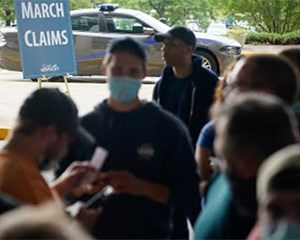JUDY WOODRUFF: Stimulus money from the latest COVID relief bill is arriving in bank accounts all over the country. Here's a look at how some people plan to spend that money and what they say about the president's legislation.
LEANDREW BELL, Louisiana: My name is Leandrew Bell. I am a 59-year-old unemployed Black male. I live in Baton Rouge, Louisiana.
JASON WELLMAN, Pennsylvania: My name is Jason Wellman. I'm the president of FilterShine Northeast out of Denver, Pennsylvania. We're a small business for restaurants. We do fire prevention-related services.
NOVA HARPER, Georgia: I'm Nova Harper. I'm from Georgia. I live in Kingsland, near the Florida line. I'm a custodian in an elementary school. I had to move once the pandemic hit. The quarantine started. And I had a nervous breakdown. I was running out of money and I'm currently living with family, sleeping on a couch, and working at an elementary school making $900-and-some-change a month, trying to save up enough to get my own apartment. I have not received my stimulus check. I will be receiving one, but I have not gotten it yet. I am going to put it in savings until I have more from my tax returns and others that I -- other money that I put away from my paycheck until I can afford to move.
NAILAH HENDRICKSON, Arizona: My name is Nailah Hendrickson. I live in Arizona. And I'm a project specialist for a Fortune 500 manufacturing company. I was able to pay off or pay down a lot of my son's hospital bills from his self-harm and his attempted suicide during COVID. He is 16 and was out of school due to COVID. And he had actually three attempts at committing suicide, and had to be hospitalized and put into a mental hospital. In those three attempts, we have over $10,000 worth of bills, and that's with insurance.

MIMI PERREAULT, North Carolina: My name is Dr. Mimi Perreault. And I'm a journalism professor in Tennessee at East Tennessee State University. And I live in Boone, North Carolina. I have four children. The oldest is 9 and the youngest is 2. So, that actually made doing my job very challenging. I think, financially, what's really helped me with the pandemic actually is the student loan payments being deferred, because we were really having to make some decisions about how much child care we were able to use and pay on our student loans from graduate school.
JASON WELLMAN: My personal opinion of this entire relief bill is, there's a lot of wasted money. Our biggest struggle right now in what we're trying to work through is employees, hiring new employees, if you will. There's just -- our labor force is very, very slim right now. They're now basically being incentivized not to look for employment, to stay at home. On top of their normal unemployment, they're also getting a federal unemployment of an additional $300 a week now until September. It's time to incentivize workers to get back to work. The only way that we're going to recover as a country is, we have got to get our employees back out there doing work and earning the money the right way. We can't incentivize them to stay at home.
LEANDREW BELL: I was afraid to get out and look for employment because of COVID, not knowing -- because I have high blood pressure and high cholesterol, I am at risk. So I didn't want to risk to get a job. It's going to be a big help, but it's not enough. Home repairs. I'm also going to catch my bills up, and probably buy myself a pair of shoes. So, it could have been more, but I'm grateful that it is the amount that it is.
JUDY WOODRUFF: No question that a number of Americans are hurting right now. And, as you hear, reactions to President Biden's COVID relief bill vary from family to family and from person to person.













